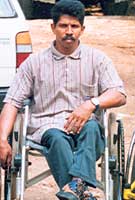Four years after the Disabled Persons Accessibility Regulations were passed, public places, including buildings and roads, continue to be unfriendly to physically disadvantaged persons. The private sector has been found to be especially negligent about making life easier for the disabled.
Speaking at a media conference on Friday convened by the Disability Organisations Joint Front (DOJF) and the Ministry of Social Services, guest speakers said little has been done to make public spaces safe and accessible to the differently-abled.
 |
| Disabled neglected. |
W. M. D. Ratnasiri, founder and president of the National Federation for the Visually Handicapped (NFVH), said there was a range of areas in daily life that continued to be outside the reach of the disabled, he said.
“Mobility aids for the disabled are expensive,” he said, “and there is not a single Braille publication available for our blind people – no Braille newspaper, no Braille magazine. And deaf persons cannot enjoy news telecasts. There are no subtitles.”
Laws were passed in 2006, under Section 25 of the Protection of the Rights of Persons with Disabilities Act of 1996, to make public places accessible and safe for the disabiled. Owners of public buildings and those responsible for public places with common services were given a period of three years to bring their premises in line with the regulations.
Because of the economic downturn and the accompanying financial hardships, the three-year grace period was extended to eight years. The eight-year period ends in October 2014.
Outdoor public spaces and facilities listed for easy access modification include roads, pedestrian crossings, pavements, bus stops and railway stations. Indoor spaces and facilities on the list include doorways, entrance and exit areas, corridors, lifts, elevators and toilets.
Mr. Ratnasiri said the country has only one qualified mobility trainer for the visually handicapped, and only four language instructors for the deaf. He said more people should be trained to provide help for the blind and the deaf.
While more than 300 blind graduates have found employment, these and other blind persons continue to encounter difficulties getting about because roads and pedestrian crossings do not have any special facilities for them.
The National Federation for the Visually Handicapped manufactures and distributes free of charge tools and instruments necessary for the disabled. However, the organisation does not have the resources to reach all disabled persons. The state and the private sector should try to help out wherever possible, Mr. Ratnasiri said.
Calistus Jayamanne, director of the National Secretariat for Persons with Disabilities, said it was the responsibility of the state and the general public to ensure that all workplaces were accessible to disabled persons.
Public venues that have been made access-easy include the National Museum, the Art Gallery, the John de Silva and Elphinstone theatres, post offices and hospitals.
Mr. Jayamanne said some hotels have committed to making their premises access easy, and some TV stations have promised to telecast their news programmes in sign language.
“Any private or state sector organisation or agency that plans to implement the Disabled Persons Accessibility Regulations can come to us for advice and guidance,” Mr. Jayamanne said. “It is time the public started to consider disabled people when they put up buildings and set up their workplaces.”
Premadasa Dissanayake, president of the Sri Lanka Foundation for the Rehabilitation of the Disabled, stressed the need for equal opportunities for the disabled.
“I have been confined to a wheelchair from the age of 20,” he said. “People should not to think of us as being disabled. We require the same resources and opportunities others enjoy. By helping us, companies and organisations are also helping themselves, by making their business more accessible.”
Two thousand and seven was named the Year of Accessibility, and the public was asked to create an enabling environment for the disabled. Three years on, little has been done in this country to make life easier for them. |


